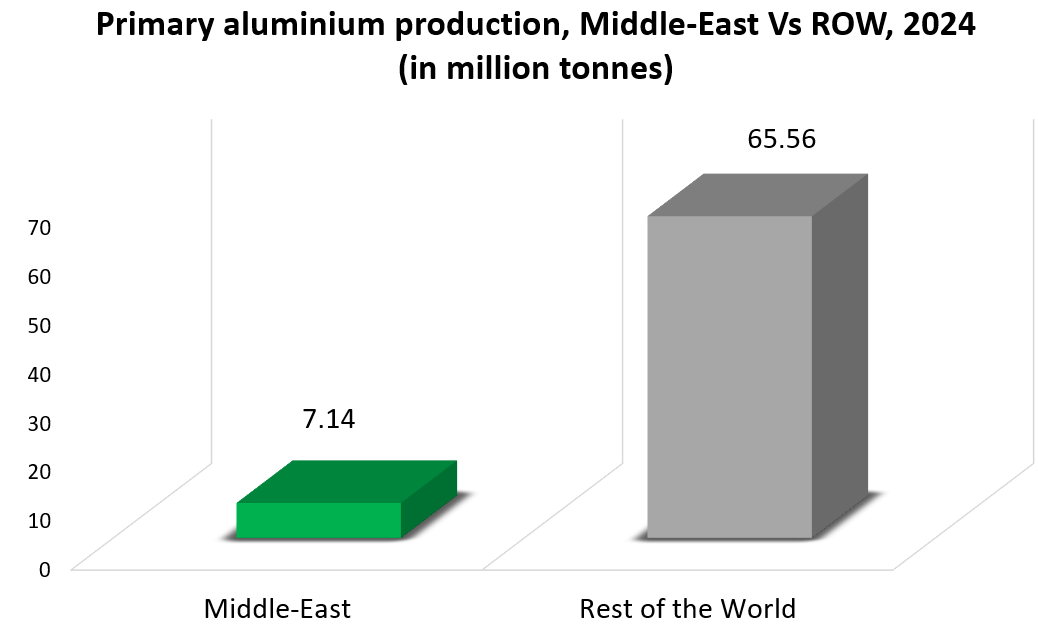

The Middle East has long been a powerhouse in the global aluminium industry, with its strategic location, abundant energy resources, and advanced technological infrastructure. As the world shifts towards sustainable production and decarbonisation, the region is embracing a new era of low-carbon aluminium production, renewable energy integration, and full operational capacity utilisation.
{alcircleadd}In light of these developments, AL Circle is set to launch its latest e-Magazine, Aluminium Middle East: Focus 2025, in mid-March 2025. This comprehensive industry publication will provide unparalleled insights into the latest trends, technological advancements, and investment opportunities within the Middle Eastern aluminium sector.

Source: IAI, AL Circle Research
Note: Production for Iran and Egypt in 2024 is estimated
Middle East: A global aluminium powerhouse
The Middle East plays a crucial role in global aluminium production, contributing around 9.82 per cent of the world’s primary aluminium output. Countries like the United Arab Emirates, Saudi Arabia, Bahrain, Oman, Qatar, Egypt, and Iran have developed world-class smelting and rolling facilities, leveraging their access to cost-effective energy and strategic trade routes.
Companies such as Emirates Global Aluminium (EGA), Aluminium Bahrain (Alba), Ma’aden Aluminium, Qatalum, Egyptalum, Iralco and Salco have positioned the region as a leader in high-quality aluminium production. These companies continue to expand capacity, invest in state-of-the-art technology, and enhance operational efficiencies to meet the growing global demand for aluminium across various industries, including automotive, aerospace, packaging, and construction.
The downstream aluminium sector in the region, with key players such as Gulf Extrusion, Taweelah Aluminium Extrusion (TALEX), Al Ghurair Aluminium, Saudi Aluminium Industries Company (SALUMCO), Balexco (Bahrain Aluminium Extrusion Company), Midal Cables, Garmco (Gulf Aluminium Rolling Mill Co.), and Oman Aluminium Rolling Company (OARC), has demonstrated significant potential. These companies support domestic consumption and contribute substantially to export markets, reinforcing the region’s global aluminium production and supply position.
Source: IAI
Transition to low-carbon aluminium production
With sustainability at the forefront of industrial transformation, Middle Eastern aluminium producers are making significant strides in reducing their carbon footprint. Smelters are increasingly integrating renewable energy sources, such as solar, into their production processes. For instance, EGA has pioneered the use of solar-powered aluminium, reinforcing the region’s commitment to green aluminium production.
Carbon capture and storage (CCS) technologies and advancements in energy-efficient smelting processes are also being adopted to ensure compliance with international environmental standards. This shift towards low-carbon aluminium production enhances the region’s global competitiveness and attracts environmentally conscious investors and buyers.
The region is increasingly investing in secondary aluminium production to enhance sustainability and reduce carbon emissions. It aims to strengthen its circular economy with advanced recycling technologies and strategic initiatives. This shift supports growing demand while minimising environmental impact.
Technology and innovation: The driving force
The adoption of cutting-edge technology is transforming the Middle Eastern aluminium industry. Industry 4.0 applications, including artificial intelligence (AI), automation, and big data analytics, are optimising production efficiency and predictive maintenance. Digital twin technology and blockchain-enabled supply chains are further improving transparency and operational control.
Moreover, the region’s aluminium producers are investing heavily in research and development (R&D) to develop advanced alloys, improve product quality, and explore sustainable alternatives such as recycled aluminium. This continuous drive for innovation is ensuring that Middle Eastern aluminium remains at the forefront of global industrial advancements.
Renewable Energy Integration: A Game Changer
One of the most notable shifts in the Middle Eastern aluminium industry is the integration of renewable energy into production processes. With an abundance of solar energy, countries in the region are investing in large-scale solar farms to power smelters, significantly reducing reliance on fossil fuels. This transition is crucial in achieving carbon neutrality and meeting the increasing demand for sustainable aluminium products.
For instance, Alba’s Line 6 expansion has been designed to improve energy efficiency, while Ma’aden Aluminium continues to explore innovative energy solutions to enhance its sustainability profile. The growing synergy between aluminium production and renewable energy sources is setting new benchmarks for responsible industrial practices.
Maximising full operational capacity
Despite global economic fluctuations, the Middle East’s aluminium industry is operating at near-full capacity, showcasing resilience and adaptability. Continuous investments in infrastructure, workforce development, and supply chain optimisation have ensured that regional producers can efficiently meet domestic and international demand.
Expansion projects and capacity upgrades are further reinforcing the industry’s growth trajectory, providing new opportunities for stakeholders across the value chain. With full operational capacity, the region is poised to meet the increasing demand for aluminium in electric vehicles (EVs), renewable energy systems, and high-tech applications.
Why participate in Aluminium Middle East: Focus 2025?
Aluminium Middle East: Focus 2025 aims to provide industry leaders, investors, and stakeholders with crucial insights into the region’s evolving aluminium landscape. Participants will gain access to expert analyses, case studies, and exclusive interviews with key decision-makers. This e-Magazine will serve as a strategic resource for businesses looking to explore investment opportunities, forge partnerships, and stay ahead in the competitive aluminium market.
By participating in this initiative, industry players can:
Conclusion
The Middle Eastern aluminium industry is at the forefront of global transformation, strongly emphasising sustainability, innovation, and full-capacity utilisation. As the region continues to redefine the future of aluminium production, Aluminium Middle East: Focus 2025 will provide an essential platform for industry stakeholders to stay informed and capitalise on emerging opportunities. Stay tuned for the official launch in March 2025 and be part of this groundbreaking initiative shaping the future of aluminium in the Middle East and beyond.



Responses






